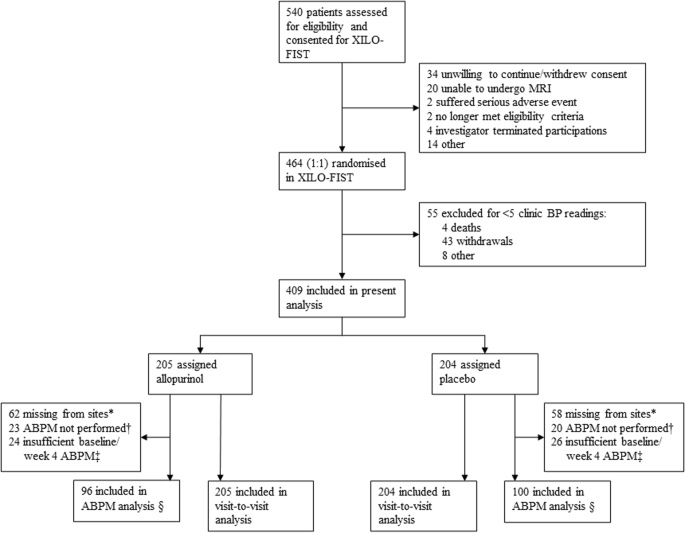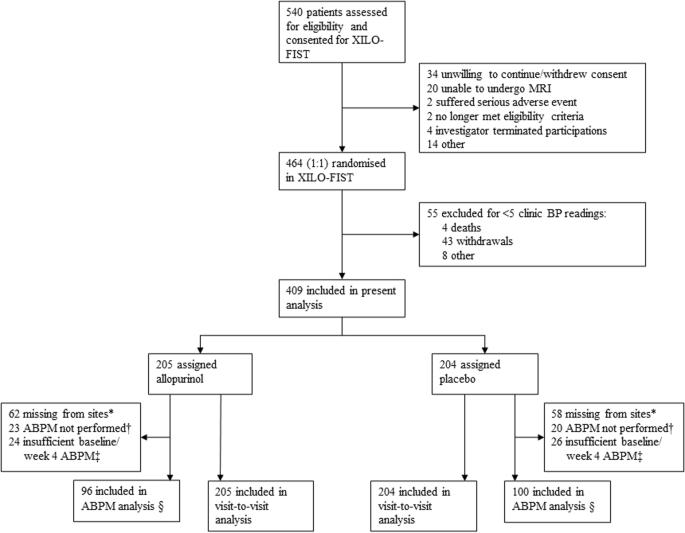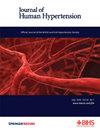Allopurinol and blood pressure variability following ischemic stroke and transient ischemic attack: a secondary analysis of XILO-FIST
IF 2.7
4区 医学
Q2 PERIPHERAL VASCULAR DISEASE
引用次数: 0
Abstract
Blood Pressure Variability (BPV) is associated with cardiovascular risk and serum uric acid level. We investigated whether BPV was lowered by allopurinol and whether it was related to neuroimaging markers of cerebral small vessel disease (CSVD) and cognition. We used data from a randomised, double-blind, placebo-controlled trial of two years allopurinol treatment after recent ischemic stroke or transient ischemic attack. Visit-to-visit BPV was assessed using brachial blood pressure (BP) recordings. Short-term BPV was assessed using ambulatory BP monitoring (ABPM) performed at 4 weeks and 2 years. Brain MRI was performed at baseline and 2 years. BPV measures were compared between the allopurinol and placebo groups, and with CSVD and cognition. 409 participants (205 allopurinol; 204 placebo) were included in the visit-to-visit BPV analyses. There were no significant differences found between placebo and allopurinol groups for any measure of visit-to-visit BPV. 196 participants were included in analyses of short-term BPV at week 4. Two measures were reduced by allopurinol: the standard deviation (SD) of systolic BP (by 1.30 mmHg (95% confidence interval (CI) 0.18–2.42, p = 0.023)); and the average real variability (ARV) of systolic BP (by 1.31 mmHg (95% CI 0.31–2.32, p = 0.011)). There were no differences in other measures at week 4 or in any measure at 2 years, and BPV was not associated with CSVD or cognition. Allopurinol treatment did not affect visit-to-visit BPV in people with recent ischemic stroke or TIA. Two BPV measures were reduced at week 4 by allopurinol but not at 2 years.


别嘌醇与缺血性中风和短暂性脑缺血发作后的血压变化:XILO-FIST 的二次分析。
血压变异性(BPV)与心血管风险和血清尿酸水平有关。我们研究了别嘌呤醇是否会降低血压变异性,以及血压变异性是否与脑小血管疾病(CSVD)的神经影像标记物和认知能力有关。我们使用了近期缺血性中风或短暂性脑缺血发作后进行两年别嘌醇治疗的随机、双盲、安慰剂对照试验的数据。采用肱动脉血压(BP)记录评估逐次BPV。在 4 周和 2 年时使用动态血压监测 (ABPM) 评估短期血压值。在基线和 2 年时进行脑磁共振成像。比较了别嘌醇组和安慰剂组之间的血压变异性,以及 CSVD 和认知能力。409 名参与者(205 名别嘌呤醇患者;204 名安慰剂患者)参与了逐次 BPV 分析。安慰剂组和别嘌呤醇组之间的每次就诊BPV指标均无明显差异。第 4 周的短期 BPV 分析纳入了 196 名参与者。别嘌醇降低了两项指标:收缩压的标准差 (SD)(降低了 1.30 mmHg(95% 置信区间 (CI):0.18-2.42,p = 0.023));收缩压的平均实际变异性 (ARV)(降低了 1.31 mmHg(95% 置信区间 (CI):0.31-2.32,p = 0.011))。第 4 周时的其他指标和 2 年后的任何指标均无差异,BPV 与 CSVD 或认知能力无关。别嘌醇治疗不影响近期缺血性卒中或 TIA 患者的逐次 BPV。别嘌醇在第 4 周降低了两项 BPV 指标,但在 2 年后并未降低。
本文章由计算机程序翻译,如有差异,请以英文原文为准。
求助全文
约1分钟内获得全文
求助全文
来源期刊

Journal of Human Hypertension
医学-外周血管病
CiteScore
5.20
自引率
3.70%
发文量
126
审稿时长
6-12 weeks
期刊介绍:
Journal of Human Hypertension is published monthly and is of interest to health care professionals who deal with hypertension (specialists, internists, primary care physicians) and public health workers. We believe that our patients benefit from robust scientific data that are based on well conducted clinical trials. We also believe that basic sciences are the foundations on which we build our knowledge of clinical conditions and their management. Towards this end, although we are primarily a clinical based journal, we also welcome suitable basic sciences studies that promote our understanding of human hypertension.
The journal aims to perform the dual role of increasing knowledge in the field of high blood pressure as well as improving the standard of care of patients. The editors will consider for publication all suitable papers dealing directly or indirectly with clinical aspects of hypertension, including but not limited to epidemiology, pathophysiology, therapeutics and basic sciences involving human subjects or tissues. We also consider papers from all specialties such as ophthalmology, cardiology, nephrology, obstetrics and stroke medicine that deal with the various aspects of hypertension and its complications.
 求助内容:
求助内容: 应助结果提醒方式:
应助结果提醒方式:


